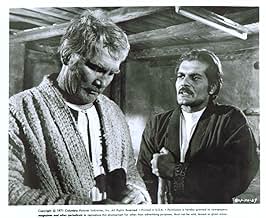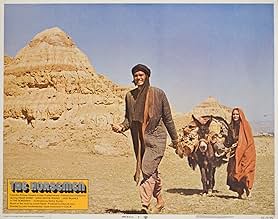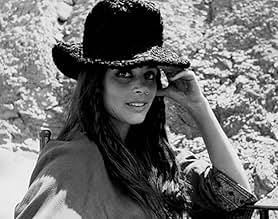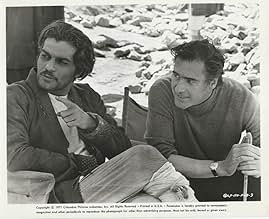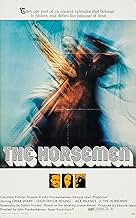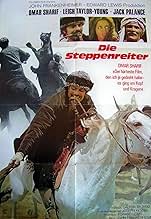IMDb RATING
6.2/10
1.4K
YOUR RATING
Drama depicting rural life in contemporary Afghanistan and the Afghani people's love for an ancient traditional sport similar to horseback polo.Drama depicting rural life in contemporary Afghanistan and the Afghani people's love for an ancient traditional sport similar to horseback polo.Drama depicting rural life in contemporary Afghanistan and the Afghani people's love for an ancient traditional sport similar to horseback polo.
- Director
- Writers
- Stars
Salmaan Peerzada
- Salih
- (as Salmaan Peer)
Aziz Resham
- Bacha to Ghulam
- (as Aziz Resh)
Vida St. Romaine
- Gypsy Woman
- (as Vida St Romaine)
Florencio Amarilla
- Arabian Man
- (uncredited)
Ishaq Bux
- Amjad Kahn
- (uncredited)
Carlos Casaravilla
- Messenger
- (uncredited)
- Director
- Writers
- All cast & crew
- Production, box office & more at IMDbPro
Featured reviews
Not having seen this film since its initial release, I have vague moments of recollection (I was eleven at the time) but, after all these years, I still remember this film, a few scenes-even the theater where I saw it-so that has to count for something. We, my parents, and myself went to many, many movies so it was not unusual for me to come along, even at decidedly adult fair such as this. My mother had a crush on Omar-notwithstanding that they share the same passion for bridge. Frankenheimer had a good reputation for producing and directing interesting, offbeat films that hit as often as they miss-The Manchurian Candidate, Grand Prix, and Black Sunday come to mind. So, we gave this film a shot.
While I do not remember the plotline to any great extent, what I do remember quite vividly was that this film took place in Afghanistan, and features quite prominently the national sport of Buzkashi-a sport whereby riders on horses attempt to deposit the carcass of a lamb in a circle. Also, this has what is quite honestly the best performance in a film by Omar Sharif you will ever find. He plays a great rider who is injured early in the film. He broads about a lot but finally finds redemption by returning to the sport that nearly killed him for that one last ride. I do not remember if he makes it through alive.
Buzkashi is an old, old brutal sport/ritual full of tradition and ceremony. The film took great pains to present this dying spectacle as realistically as possible and is the great set piece to the film. A true Man's man sport, it is not for the fainthearted. For me, at eleven, I was not used to cinematic `realism' even though by then I had seen hundreds of films. Perhaps it is why I remember it so for it made quite an impression.
The film was transferred to video but is long out of print and only available through collectors. It has not made it to DVD, unfortunately. I have not seen it since it initial release.
Still, in a long career for Frankenheimer, this is a film that should not be forgotten and is probably one of his best.
While I do not remember the plotline to any great extent, what I do remember quite vividly was that this film took place in Afghanistan, and features quite prominently the national sport of Buzkashi-a sport whereby riders on horses attempt to deposit the carcass of a lamb in a circle. Also, this has what is quite honestly the best performance in a film by Omar Sharif you will ever find. He plays a great rider who is injured early in the film. He broads about a lot but finally finds redemption by returning to the sport that nearly killed him for that one last ride. I do not remember if he makes it through alive.
Buzkashi is an old, old brutal sport/ritual full of tradition and ceremony. The film took great pains to present this dying spectacle as realistically as possible and is the great set piece to the film. A true Man's man sport, it is not for the fainthearted. For me, at eleven, I was not used to cinematic `realism' even though by then I had seen hundreds of films. Perhaps it is why I remember it so for it made quite an impression.
The film was transferred to video but is long out of print and only available through collectors. It has not made it to DVD, unfortunately. I have not seen it since it initial release.
Still, in a long career for Frankenheimer, this is a film that should not be forgotten and is probably one of his best.
Set in Afghanistan, John Frankenheimer's 'The Horsemen' is the story of a tribesman determined to rival his father at horsemanship
Uraz is sent by his father Tursen to win the traditional Royal Buzkashi on the field of Bagrami in the capital city of Kabul
Uraz on Jahil has to battle for control of a headless calf, carry it around a blue flag, and deposit it back in the 'Circle of Justice' thus signifying that he wins the king's pennant and remains as the master chapandaz of all Afghanistan During the tournament, opposing horsemen use their whips to urge on their horses and to hit the rider for the chance to snatch the heavy carcass
The motion picture turns around five well drawn characters: an angered son eaten up with vanity; a brave father who knew something worse than danger; a nomad woman whose touch defiles; a once loyal servant lusted for an 'unclean woman;' and a wager from the high passes of the East where 'men know how to forge fine weapons and use them well'
Uraz (Omar Sharif) deliberately chose to bribe his devoted servant with the magnificent white stallion in order to increase the already terrible dangers which he hopes to conquer
Zareh (Leigh-Taylor Young) urges her man to kill his high blood master to secure for herself his horse and his money
Tursen (Jack Palance) know nothing but evil legends about an impossible road taken by his embittered son His pain, remorse, and blood wept for a son lost through his fault
Mukhi (David de Keyser) forgets his humble and faithful world in the arms of the 'untouchable' woman who pushes him to murder the great prince
Hayatal (Peter Jeffrey) takes the challenge against 'the Prince Ram of the Valley' declaring openly to Uraz: 'What a one-horned ram can do, a one-legged chapandaz can do better!'
To understand 'The Horsemen' you must understand the rage, the beauty, and the tradition of a mountainous and landlocked country, isolated and left outside the mainstream of civilization
Written by Academy Award winner Dalton Trumbo (The Brave One, Best Original Screenplay, 1956) 'The Horsemen' is a passionate film for men only The film is a search that marks out the true concepts of honesty, integrity, loyalty, and trust
Uraz on Jahil has to battle for control of a headless calf, carry it around a blue flag, and deposit it back in the 'Circle of Justice' thus signifying that he wins the king's pennant and remains as the master chapandaz of all Afghanistan During the tournament, opposing horsemen use their whips to urge on their horses and to hit the rider for the chance to snatch the heavy carcass
The motion picture turns around five well drawn characters: an angered son eaten up with vanity; a brave father who knew something worse than danger; a nomad woman whose touch defiles; a once loyal servant lusted for an 'unclean woman;' and a wager from the high passes of the East where 'men know how to forge fine weapons and use them well'
Uraz (Omar Sharif) deliberately chose to bribe his devoted servant with the magnificent white stallion in order to increase the already terrible dangers which he hopes to conquer
Zareh (Leigh-Taylor Young) urges her man to kill his high blood master to secure for herself his horse and his money
Tursen (Jack Palance) know nothing but evil legends about an impossible road taken by his embittered son His pain, remorse, and blood wept for a son lost through his fault
Mukhi (David de Keyser) forgets his humble and faithful world in the arms of the 'untouchable' woman who pushes him to murder the great prince
Hayatal (Peter Jeffrey) takes the challenge against 'the Prince Ram of the Valley' declaring openly to Uraz: 'What a one-horned ram can do, a one-legged chapandaz can do better!'
To understand 'The Horsemen' you must understand the rage, the beauty, and the tradition of a mountainous and landlocked country, isolated and left outside the mainstream of civilization
Written by Academy Award winner Dalton Trumbo (The Brave One, Best Original Screenplay, 1956) 'The Horsemen' is a passionate film for men only The film is a search that marks out the true concepts of honesty, integrity, loyalty, and trust
An excellent adaptation of the Book by Joseph Kessel; centered on the running of the first Buskashi in Kabul by the King of Afghanistan circa the 1950s. I have read the book in its English translation(1968) and seen the Movie on VHS.(1671) The movie is very fresh and not dated; and all the more compelling due to recent liberation from Arab control of that country. Footage of the Buskashi just has to be from a real game. The games were played at Bagram (Bagrimi) the plain above Kabul which was made an airport in recent years.
The author, Kessel can be compared to Joseph Conrad and Hemmingway as he apparently lived what he wrote. The book has themes just as penetrating as "Heart of Darkness" or "the Old man and the Sea" and much has translated well to this Movie. The acting is well done and convincingly. Local color shots were done in the late sixties giving this film a truly timeless feeling with little motor traffic evident.
One inspired scene has Jack Palance as Chief breeder and legendary Horseman, interrupted in his instructions to his team by the noise of a Jet; and looking up to see contrails above.
This is a real treasure just begging to be on DVD.
The author, Kessel can be compared to Joseph Conrad and Hemmingway as he apparently lived what he wrote. The book has themes just as penetrating as "Heart of Darkness" or "the Old man and the Sea" and much has translated well to this Movie. The acting is well done and convincingly. Local color shots were done in the late sixties giving this film a truly timeless feeling with little motor traffic evident.
One inspired scene has Jack Palance as Chief breeder and legendary Horseman, interrupted in his instructions to his team by the noise of a Jet; and looking up to see contrails above.
This is a real treasure just begging to be on DVD.
Omar Sharif and Jack Palance may be the only names in this cast that most will recognize but the story based on an Afghan tale, set in Afghanistan before the Russian invasion, is a classic tale which lays out a great deal of Afghan culture during the period before the great disruption by the West. Afghanistan returned to the public eye after the post-911 invasion to depose the Taliban but the state of knowledge about these marvelous independent people who fought the British Empire to a standstill, still remains obscure. The game of buzgashi, a kind of polo for Weidman, was the core for many of the tribesmen. Its importance as an institution marking the status of tribes and individuals has no real counterpart in Western culture, and this is a tale of intrigue and self-learning, framed in a cultural setting we still have yet to understand.
There is so much of interest in this compelling film, set in Afghanistan. Based on the book by Joseph Kessells, a writer of rare insight.
Centered around the ancient game of Buzkashi, played on horseback, and only in the three northern provinces of Mazar-i-Sharif, Maimana and Kataghan. [The game had it's origin in a training routine instituted by Ghengiz Khan, which both conditioned his men for warfare and provided a means of feeding his army. A very large circle was formed by his warriors and as the circle closed no animal was permitted to escape.]
There are some terrific scenes of the first "Royal Buzkashi" played on Bagrami Plain, just outside Kabul, which had been decreed by the king. Also some great footage of the country, depicting the beautiful and varied terrain encountered as Uroz makes the self-imposed and dangerous journey back to his home province in the North.
The interplay of all the characters is an education in understanding the powerful role human emotion and upbringing play in all our lives, as both Tursen(the father) and Uroz(the son) attempt to come to terms with their own harsh anger and pride. The consequences spill over and embroil other individuals in the story. The story also gives some insight into the different way of thinking engendered by the cultural mix of religion,relatively isolated living, and living in a harsh environment where survival can be pretty raw.
Contrast is drawn by the mix of ancient and modern. One such scene has Tursen (Jack Palance),who as Head of Osman Bey's stable is addressing the chopendoz,(players of Buzkashi), pauses to look upwards at a jetliner passing overhead whilst he stands on "The Roof of the World". Another takes place in the modern hospital in Kabul.
Both Palance & Sharif give of their finest, very well supported by a great character cast.
A dramatic part of the story unfolds in the Bamian Valley, where Uroz gambles & loses the very thing he later realise he loves and wants back. Historically this part of the film contains important footage of the giant Budhas that were carved into the cliffside, until deliberately destroyed by Talliban militia.
All in all, an excellent and enjoyable film and I am surprised it has not been shown on Television or re-issued on disc, as the world focussed on that area just a short time ago.
Centered around the ancient game of Buzkashi, played on horseback, and only in the three northern provinces of Mazar-i-Sharif, Maimana and Kataghan. [The game had it's origin in a training routine instituted by Ghengiz Khan, which both conditioned his men for warfare and provided a means of feeding his army. A very large circle was formed by his warriors and as the circle closed no animal was permitted to escape.]
There are some terrific scenes of the first "Royal Buzkashi" played on Bagrami Plain, just outside Kabul, which had been decreed by the king. Also some great footage of the country, depicting the beautiful and varied terrain encountered as Uroz makes the self-imposed and dangerous journey back to his home province in the North.
The interplay of all the characters is an education in understanding the powerful role human emotion and upbringing play in all our lives, as both Tursen(the father) and Uroz(the son) attempt to come to terms with their own harsh anger and pride. The consequences spill over and embroil other individuals in the story. The story also gives some insight into the different way of thinking engendered by the cultural mix of religion,relatively isolated living, and living in a harsh environment where survival can be pretty raw.
Contrast is drawn by the mix of ancient and modern. One such scene has Tursen (Jack Palance),who as Head of Osman Bey's stable is addressing the chopendoz,(players of Buzkashi), pauses to look upwards at a jetliner passing overhead whilst he stands on "The Roof of the World". Another takes place in the modern hospital in Kabul.
Both Palance & Sharif give of their finest, very well supported by a great character cast.
A dramatic part of the story unfolds in the Bamian Valley, where Uroz gambles & loses the very thing he later realise he loves and wants back. Historically this part of the film contains important footage of the giant Budhas that were carved into the cliffside, until deliberately destroyed by Talliban militia.
All in all, an excellent and enjoyable film and I am surprised it has not been shown on Television or re-issued on disc, as the world focussed on that area just a short time ago.
Did you know
- TriviaThe film began shooting using 65mm negative (Super Panavision), but during production Columbia Pictures went through a change in management. The budgets for this and another 65mm production, L'Or de Mackenna (1969), were cut and both films were forced to switch over to 35mm anamorphic Panavision. However, both were released in 70mm, with the later-shot sections blown up. In later years, the mix-and-match formats made restoration of the films more time consuming and expensive than if they'd been shot entirely in 65mm, and they were preserved in 35mm only.
- GoofsWhen Tursen (Jack Palance) has a flashback to one of his past victories, one can tell that he is swinging a phony, lightweight, stuffed goat carcass around when his horse jumps up on the mud hut.
- Quotes
District Chief: What demon has possessed you to mock these good people with that piece of dog-bait?
- How long is The Horsemen?Powered by Alexa
Details
- Release date
- Country of origin
- Official site
- Language
- Also known as
- The Horsemen
- Filming locations
- Afghanistan(Exterior)
- Production companies
- See more company credits at IMDbPro
Box office
- Budget
- $6,000,000 (estimated)
- Runtime1 hour 49 minutes
- Sound mix
- Aspect ratio
- 2.35 : 1
Contribute to this page
Suggest an edit or add missing content



